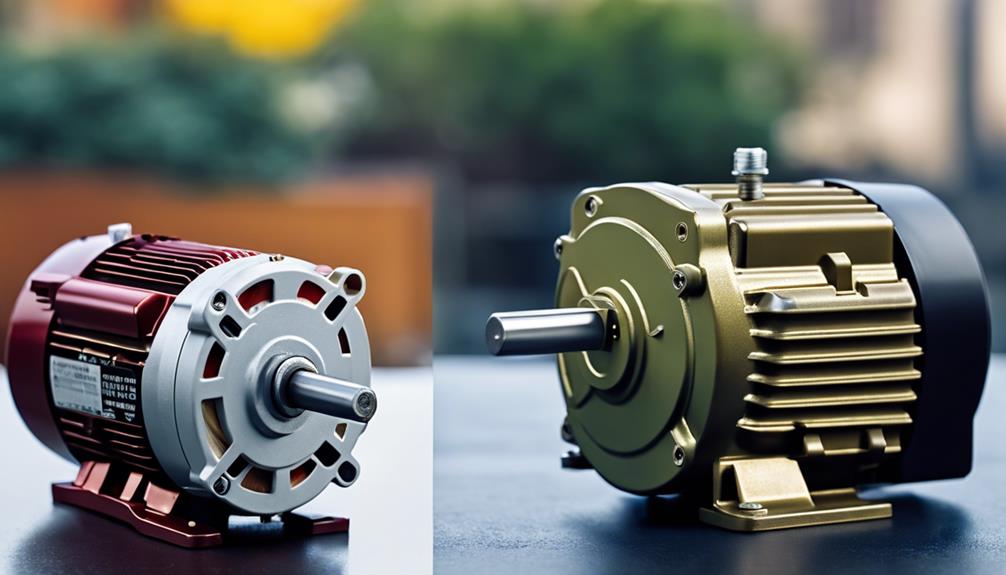Submit Your Request
Please fill out the form below.
Please fill out the form below.
Need a custom solution?

When it comes to motor efficiency, did you know that DC motors typically have a higher starting torque compared to AC motors?
The distinction between these two types goes beyond just torque. Understanding the differences and advantages of DC motors over AC motors can provide valuable insights into the optimal choice for various applications.
From control mechanisms to maintenance costs, exploring the nuances between these motor types can lead to informed decisions with long-term benefits.
When comparing the efficiency of DC and AC motors, it becomes evident that the operational variance is a critical factor to consider in selecting the optimal motor for specific applications. Energy consumption and power output are key elements that differentiate DC and AC motors.
DC motors are known for their higher efficiency rates compared to AC motors, especially when operating at variable speeds. This higher efficiency is primarily due to the direct current nature of DC motors, which allows for a more straightforward energy conversion process.
On the other hand, AC motors are traditionally more efficient in constant speed applications due to their design and the way they handle power output. AC motors often require additional components to control speed and torque, which can impact overall efficiency.
Understanding the energy consumption and power output characteristics of both DC and AC motors is crucial in determining which type of motor best suits the specific requirements of a given application.
Characteristics that play a crucial role in determining their efficiency and performance in various applications. DC motors typically offer more straightforward speed regulation compared to AC motors. This is because DC motors’ speed can be controlled by adjusting the voltage input. In contrast, AC motors require more complex control mechanisms such as variable frequency drives to regulate speed effectively.
When it comes to power consumption, DC motors tend to be more efficient in applications where variable speed control is required. This is because DC motors can operate at higher efficiency levels over a wider range of speeds compared to AC motors. Additionally, DC motors exhibit better power factor characteristics, leading to lower power losses during operation.
In exploring the application diversity of DC motors and AC motors, the operational capabilities and limitations of each type become apparent.
Understanding the power output and speed control capabilities of DC and AC motors is crucial in selecting the right motor type for a specific application.
How do maintenance costs compare between DC and AC motors in terms of long-term operational efficiency and reliability?
When examining the cost effectiveness of DC versus AC motors, it’s crucial to consider maintenance expenses over the lifespan of the motors. DC motors generally have simpler designs with fewer components compared to AC motors. This simplicity often leads to lower maintenance costs for DC motors. Additionally, DC motors have brushes that require periodic replacement, which is a predictable maintenance task.
On the other hand, AC motors typically have more complex designs with components such as capacitors and additional winding configurations, which can lead to higher maintenance costs over time due to the increased likelihood of component failures.
In terms of reliability comparison, DC motors tend to have higher reliability due to their simpler design and fewer components that could potentially fail. However, AC motors have been continuously improved over time, and modern AC motor designs can offer comparable reliability to DC motors in certain applications.
When assessing maintenance costs, it’s essential to weigh the initial investment against long-term operational efficiency and reliability to determine the most cost-effective option for a specific application.
When evaluating the environmental impact of DC and AC motors, it’s crucial to consider factors such as energy efficiency, emissions, and end-of-life disposal processes.
Considering these factors, DC motors tend to offer environmental advantages over AC motors, primarily in terms of energy efficiency and carbon emissions. Proper disposal and recycling processes for both types of motors are crucial to mitigate their environmental impact effectively.
When integrating renewable energy sources like solar panels or wind turbines, DC motors can be easily adapted due to their inherent compatibility. They offer efficient energy conversion, mitigating integration challenges and reducing environmental impact compared to AC motors.
In extreme temperatures, DC motors exhibit superior thermal stability compared to AC motors. This enhanced performance efficiency is due to their simpler design and ability to control speed and torque precisely, making them ideal for harsh environments.
When considering safety regulations for DC motors versus AC motors, it’s crucial to note differences in installation requirements and efficiency standards. DC motors generally have simpler installation needs but may require additional safety precautions due to energy consumption variations.
To enhance efficiency, ongoing technological advancements focus on optimizing motor design, improving materials, and refining control systems for both DC and AC motors. These innovations aim to boost performance, reduce energy consumption, and enhance overall operational effectiveness.
In terms of susceptibility to electromagnetic interference, DC motors generally exhibit higher noise immunity than AC motors due to simpler design and less susceptibility to harmonics. Shielding techniques are crucial for electromagnetic compatibility.
In conclusion, when comparing DC and AC motors, it’s evident that DC motors offer higher efficiency, precise control mechanisms, and a wider range of applications compared to AC motors.
Additionally, DC motors have lower maintenance costs and a more favorable environmental impact.
Overall, the unique advantages of DC motors make them a preferred choice for various industries and applications where precision, efficiency, and reliability are paramount.